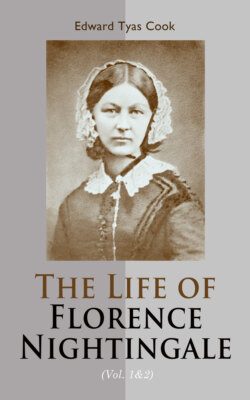Читать книгу The Life of Florence Nightingale (Vol. 1&2) - Edward Tyas Cook - Страница 38
На сайте Литреса книга снята с продажи.
CHAPTER VII
THE SINGLE LIFE
ОглавлениеTable of Contents
The craving for sympathy, which exists between two who are to form one indivisible and perfect whole, is in most cases between man and woman, in some between man and God. This the Roman Catholics have understood and expressed under the simile, Christ the bridegroom, the Nun married to Him, the Monk married to the Church; or as St. Francis to poverty, or as St. Ignatius Loyola to the divine mistress of his thoughts, the Virgin. This sort of tie between man and God seems alone able to fill the want of the other, the permanent exclusive tie between the one man and the one woman.—Florence Nightingale: Suggestions for Thought.
“I had three paths among which to choose,” wrote Miss Nightingale in a diary of 1850: “I might have been a literary woman, or a married woman, or a Hospital Sister.” We have seen how she turned away from the first path. Why did she reject the second?
* * * * *
“Our dear Flo,” wrote Mrs. Bracebridge to Miss Clarke in 1844, “has just recovered from a severe cold, but I hear nothing of what I long for, i.e. some noble-hearted, true man, one who can love her as she deserves to be loved, prepared to take her to a house of her own.” And three years later another friend, Fanny Allen, in describing a visit to Embley, said of Florence: “What a wife she would make for a man worthy of her! but I am not sure I yet know the mate fit for her.” The two Nightingale girls, she surmised, would experience a “difficulty in finding any one they would like well enough to forsake such a home.”50 In the case of Florence, the position was ill understood by outsiders. To her the home was not a happy garden which she would be very reluctant to forsake, but rather a gilded cage from which she eagerly sought a way of escape. To us who have the means of knowing her inmost thoughts and feelings, the question thus presents itself in another light than that in which it appeared to her friends at the time. She craved for a larger, fuller life than she could find at home. Why could she not, or why did she not, seek it in marriage? It is love that sometimes “frees the imprisoned spirit,” that enables it to find and to express itself. That Miss Nightingale remained single was not the result of lack of opportunity to marry. The reason is to be found elsewhere—in feelings, thoughts, and ideals, in reasoned convictions and aspirations, which, if I can present them aright, will illuminate her character and her career.
In 1873 Miss Nightingale, like the rest of the world, was reading Middlemarch, and a paper which she wrote in that year contained some notice of George Eliot's heroine.51 “A novel of genius has appeared. Its writer once put before the world (in a work of fiction too), certainly the most living, probably the most historically truthful, presentment of the great Idealist, Savonarola of Florence. This author now can find no better outlet for the heroine—also an Idealist—because she cannot be a ‘St. Teresa’ or an ‘Antigone,’ than to marry an elderly sort of literary impostor, and, quick after him, his relation, a baby sort of itinerant Cluricaune (see Irish Fairies) or inferior Faun (see Hawthorne's matchless Transformation). Yet close at hand, in actual life, was a woman—an Idealist too—and if we mistake not, a connection of the author's, who has managed to make her ideal very real indeed. By taking charge of blocks of buildings in poorest London, while making herself the rent-collector, she found work for those who could not find work for themselves; she organized a system of visitors; … she brought sympathy and education to bear from individual to individual, … so that one might be tempted to say, ‘Were there one such woman with power to direct the flow of volunteer help, nearly everywhere running to waste, in every street of London's East End, almost might the East End be persuaded to become Christian.’ Could not the heroine, the ‘sweet sad enthusiast,’ have been set to some such work as this? Indeed it is past telling the mischief that is done in thus putting down youthful ideals. There are not too many to begin with. There are few indeed to end with—even without such a gratuitous impulse as this to end them.” In this passage, as in much that Florence Nightingale wrote, there is an autobiographical note. She did not marry because she held fast to an ideal—an ideal nearer to that of Octavia Hill than to that of Dorothea Brooke.
